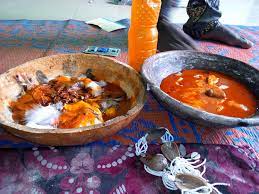Also known as Chango, Sogbo or Ebioso (Benin), Shango is a Yoruba deity who represents thunder, lightning, fire, and justice.
He is depicted as a powerful and feared god who wields a double-headed axe and uses lightning bolts to punish his enemies.
He is often associated with kingship, as he is believed to have been a former king of the Oyo Empire.
In Cuban Santeria, Shango is syncretized with the Catholic Saint Barbara, who is also associated with thunder and lightning.
Shango is revered by many practitioners of African diaspora religions in the Caribbean and South America.
He is seen as a force for justice and protection, and his followers often seek his aid in matters of love, health, and money.
Overall, Shango holds an important place in the religious traditions of the Yoruba people and their descendants.
His power and influence continue to be felt by millions of his believers around the world today.
As a divine entity, Shango is believed to have his preferences when it comes to food, which may vary depending on the region and culture in which he is worshipped.
His worshippers need to bring food offerings he likes to show reverence and respect to the deity.
It is a way to strengthen the bonds between the worshipper and the divine and to establish a mutually beneficial relationship.
So, What Does Shango Like To Eat?

1. Red Foods and Drinks
In Yoruba mythology, Shango is associated with the color red, which represents passion and vitality.
His diet reflects this symbolism, as it is filled with colorful foods.
To that end, he enjoys red offerings such as pomegranates, red apples, red wine, and red pepper.
In South American regions such as Brazil, where Shango is often syncretized with Catholic saints, offerings of red wine and red peppers are common.
2. Amala
Amala is a cornmeal porridge prepared using okra.
It can be flavored with ingredients like palm oil, pepper, and smoked fish, and is one of Shango’s favorite dishes.
3. Staple Crops
The traditional diet of Shango includes yams, corn, and beans, which are staple crops in the Yoruba region.
These foods are often mixed to create a dish called “agidi”, which is also a type of porridge.
By requesting the offering of crops, which are easily accessible in the region, Shango shows consideration for all his worshippers regardless of their social class.
4. Meat and Fish
Shango also enjoys meat and fish, which are often prepared during celebrations and rituals dedicated to him.
In particular, Shango is said to be fond of fowl, lamb, and ram meat, which are sacrificed in his honor.
The meat is cooked with peppers, onion, and other spices to create a rich and flavorful stew.
Fish is also a popular food for Shango, and is often grilled or dried.
5. Fruits and Vegetables
Although Shango is known for his love of meat and spicy food, he also enjoys fruits and vegetables.
Apples, mangoes, oranges, and pineapples are some of his favorite fruits.
He also likes the common vegetables in the Yoruba region, such as okra, spinach, and bell peppers.
These ingredients are often combined with meat or fish to create a flavorful and nutritious meal.
6. Flavor and Spices
Being a powerful deity, Shango enjoys a well-prepared dish with spices and a bold flavor.
After all, nothing says ‘bold’ as having power over thunder and lightning.
As a result, he prefers spices that give his food a fiery kick such as ginger, cayenne pepper, and black pepper.
His preferred dish is one prepared using palm oil, which provides a smooth and buttery texture to the food.
7. Other Offerings
It is important to note that offerings to Shango are not limited to food alone.
Shango is also associated with thunder, fire, and other natural phenomena, so offerings such as tobacco, alcohol, rum, cigars, and other sacred items are also commonly made.
Wrap Up
Shango’s culinary tastes reflect his personality and symbolism.
He enjoys bold and spicy flavors, and his diet is influenced by the staple crops and ingredients of the Yoruba region.
By understanding what Shango likes to eat, his worshippers and those seeking to please him gain insight into his character and his role in Yoruba mythology.
The Yoruba god of thunder acts on behalf of those honoring his offering preferences.
However, making offerings to Shango is not just about pleasing him; it is also about fostering a deeper connection among his followers who share similar beliefs and values.
Truly, no one in Yoruba and other regions that worship the deity can say that they have nothing to offer that fits into his dietary preference.

